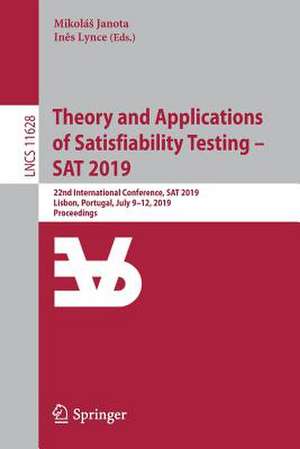Theory and Applications of Satisfiability Testing – SAT 2019: 22nd International Conference, SAT 2019, Lisbon, Portugal, July 9–12, 2019, Proceedings: Lecture Notes in Computer Science, cartea 11628
Editat de Mikoláš Janota, Inês Lynceen Limba Engleză Paperback – 29 iun 2019
The 19 revised full papers presented together with 7 short papers were carefully reviewed and selected from 64 submissions. The papers address different aspects of SAT interpreted in a broad sense, including (but not restricted to) theoretical advances (such as exact algorithms, proof complexity, and other complexity issues), practical search algorithms, knowledge compilation, implementation-level details of SAT solvers and SAT-based systems, problem encodings and reformulations, applications (including both novel application domains and improvements to existing approaches), as well as case studies and reports on findings based on rigorous experimentation.
Din seria Lecture Notes in Computer Science
- 20%
 Preț: 1061.55 lei
Preț: 1061.55 lei - 20%
 Preț: 307.71 lei
Preț: 307.71 lei - 20%
 Preț: 438.69 lei
Preț: 438.69 lei - 20%
 Preț: 579.30 lei
Preț: 579.30 lei -
 Preț: 410.88 lei
Preț: 410.88 lei - 17%
 Preț: 427.22 lei
Preț: 427.22 lei - 20%
 Preț: 596.46 lei
Preț: 596.46 lei - 15%
 Preț: 448.04 lei
Preț: 448.04 lei - 20%
 Preț: 353.50 lei
Preț: 353.50 lei -
 Preț: 389.49 lei
Preț: 389.49 lei - 20%
 Preț: 309.90 lei
Preț: 309.90 lei - 20%
 Preț: 645.28 lei
Preț: 645.28 lei - 20%
 Preț: 763.23 lei
Preț: 763.23 lei - 15%
 Preț: 580.46 lei
Preț: 580.46 lei - 20%
 Preț: 310.28 lei
Preț: 310.28 lei - 20%
 Preț: 655.02 lei
Preț: 655.02 lei - 20%
 Preț: 1183.14 lei
Preț: 1183.14 lei - 20%
 Preț: 340.32 lei
Preț: 340.32 lei -
 Preț: 449.57 lei
Preț: 449.57 lei - 20%
 Preț: 591.51 lei
Preț: 591.51 lei - 18%
 Preț: 938.83 lei
Preț: 938.83 lei - 20%
 Preț: 337.00 lei
Preț: 337.00 lei - 20%
 Preț: 649.50 lei
Preț: 649.50 lei - 20%
 Preț: 607.40 lei
Preț: 607.40 lei - 20%
 Preț: 1414.79 lei
Preț: 1414.79 lei - 20%
 Preț: 1024.44 lei
Preț: 1024.44 lei - 20%
 Preț: 583.40 lei
Preț: 583.40 lei - 20%
 Preț: 453.32 lei
Preț: 453.32 lei - 20%
 Preț: 575.49 lei
Preț: 575.49 lei - 20%
 Preț: 1075.26 lei
Preț: 1075.26 lei - 20%
 Preț: 585.88 lei
Preț: 585.88 lei - 20%
 Preț: 825.93 lei
Preț: 825.93 lei - 17%
 Preț: 360.20 lei
Preț: 360.20 lei - 20%
 Preț: 763.23 lei
Preț: 763.23 lei - 20%
 Preț: 340.32 lei
Preț: 340.32 lei - 20%
 Preț: 504.58 lei
Preț: 504.58 lei - 20%
 Preț: 369.13 lei
Preț: 369.13 lei - 20%
 Preț: 580.93 lei
Preț: 580.93 lei - 20%
 Preț: 343.62 lei
Preț: 343.62 lei - 20%
 Preț: 350.21 lei
Preț: 350.21 lei - 20%
 Preț: 583.40 lei
Preț: 583.40 lei - 20%
 Preț: 583.40 lei
Preț: 583.40 lei - 15%
 Preț: 438.59 lei
Preț: 438.59 lei - 20%
 Preț: 341.95 lei
Preț: 341.95 lei - 20%
 Preț: 238.01 lei
Preț: 238.01 lei - 20%
 Preț: 538.30 lei
Preț: 538.30 lei
Preț: 339.47 lei
Preț vechi: 424.34 lei
-20% Nou
Puncte Express: 509
Preț estimativ în valută:
64.97€ • 67.57$ • 53.63£
64.97€ • 67.57$ • 53.63£
Carte tipărită la comandă
Livrare economică 12-26 aprilie
Preluare comenzi: 021 569.72.76
Specificații
ISBN-13: 9783030242572
ISBN-10: 3030242579
Pagini: 470
Ilustrații: XIV, 425 p. 515 illus., 37 illus. in color.
Dimensiuni: 155 x 235 mm
Greutate: 0.61 kg
Ediția:1st ed. 2019
Editura: Springer International Publishing
Colecția Springer
Seriile Lecture Notes in Computer Science, Theoretical Computer Science and General Issues
Locul publicării:Cham, Switzerland
ISBN-10: 3030242579
Pagini: 470
Ilustrații: XIV, 425 p. 515 illus., 37 illus. in color.
Dimensiuni: 155 x 235 mm
Greutate: 0.61 kg
Ediția:1st ed. 2019
Editura: Springer International Publishing
Colecția Springer
Seriile Lecture Notes in Computer Science, Theoretical Computer Science and General Issues
Locul publicării:Cham, Switzerland
Cuprins
Computational Sustainability: Computing for a Better World.- Machine Learning in Automated and Interactive Theorem Proving.- Circular (Yet Sound) Proofs.- Short Proofs in QBF Expansion.- Proof Complexity of QBF Symmetry Recomputation.- Satisfiability Threshold for Power Law Random 2-SAT in Configuration Model.- DRAT Proofs, Propagation Redundancy, and Extended Resolution.- Knowledge Compilation Languages as Proof Systems.- The Equivalences of Refutational QRAT.- A SAT-based System for Consistent Query Answering.- Incremental Inprocessing in SAT Solving.- Local Search for Fast Matrix Multiplication.- Speeding Up Assumption-Based SAT.- Simplifying CDCL Clause Database Reduction.- QRAT Polynomially Simulates nforall-Exp+Res.- QRATPre+: Effective QBF Preprocessing via Strong Redundancy Properties.- On Computing the Union of MUSes.- Revisiting Graph Width Measures for CNF-Encodings.- DRMaxSAT with MaxHS: First Contact.- Backing Backtracking.- Assessing Heuristic Machine Learning Explanations with Model Counting.- Syntax-Guided Rewrite Rule Enumeration for SMT Solvers.- DRAT-based Bit-Vector Proofs in CVC4.- Combining Resolution-Path Dependencies with Dependency Learning.- Proof Complexity of Fragments of Long-Distance Q-Resolution.- Guiding High-Performance SAT Solvers with Unsat-Core Predictions.- Verifying Binarized Neural Networks by Angluin-Style Learning.- CrystalBall: Gazing in the Black Box of SAT Solving.- Clausal Abstraction for DQBF.- On Super Strong ETH.
